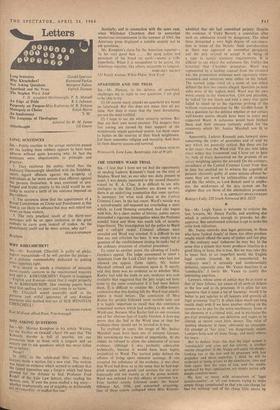Long Sentences Why Khrushchev?
Not Asking Questions Apartheid and the Press The Stephen Ward Trial F. H. A niphlett Micklewright, P. R. Mursell
An Edge of Pride B. S. Johnson Purposely on Purpose Miss Katharine M. R. Kenyon
Monopoly or Choice Ralph Harris An Anniversary • • 'S. M.' The Language of Theologians Admiral Sir W. M. James Afterthought Jill Emery
Gerald Sparrow Raymond Parkin Margaret Halsey Patrick Duncan
LONG SENTENCES
SIR,—Public reaction to the savage sentences passed on the leading train robbers appears to have been adverse without quite knowing why. In fact the sentences were objectionable in principle and Practice:
I. They reinforce the public belief that the Judiciary (increasingly identified with the Establish- ment) regard offences against the property cf individuals as far more serious than offences against the persons themselves. A man convicted of pro- longed and brutal cruelty to his child would be un- lucky to receive a tenth of the sentence imposed on the robbers.
2. The sentences show that the appointment of a Royal Commission on Crime and Punishment at this time is not likely to advance,but may well retard our views on these matters.
3. The only practical result of the thirty-year sentences will be an open invitation to the great robbers to carry guns instead of coshes. As the punishment could not be more severe, why not? GERALD SPARROW Brighton






































 Previous page
Previous page